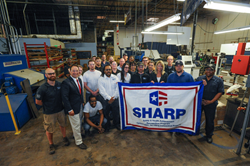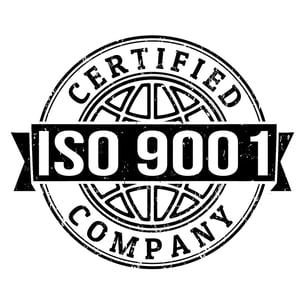 For any business, having the right supplies is critical. This is especially true for manufacturers, who rely on having quality materials and tools to produce top-notch results for their own clients.
For any business, having the right supplies is critical. This is especially true for manufacturers, who rely on having quality materials and tools to produce top-notch results for their own clients.
Finding the right suppliers for key materials and tools can mean the difference between being able to work efficiently, and having to put up with production delays and constant reworks.
The question is, how can you find the right supplier for your business’ needs?
To help you answer this question, Marlin Steel has assembled a list of the top 5 things you should look for in your suppliers to sort out the best from the rest:
#1: Reliability
Meeting your own production timetables is next to impossible if your suppliers take forever to get you the tools and materials you need to start work in the first place. Unreliable suppliers who don’t have consistent delivery times are not suppliers you want to rely on during crunch time when you’re rushing to finish a big order.
Finding a reliable supplier means that you have access to what you need when you need it, not 4-5 months from when you started your order.
When considering a supplier, check their past history with other customers. What was the average wait time for an order to be fulfilled? Did the supplier meet deadlines for providing supplies consistently?
If delivery times were long, and deadlines were frequently missed, then the supplier might not provide the level of reliability that you need to stay on-schedule. On the other hand, if delivery times were short and the supplier reliably met or beat their schedule for delivery, you’ll know you can rely on that supplier for important orders without having to worry if you’ll get them on time.
#2: ISO Certifications
 Another good way to identify a reliable supplier is to check their ISO certification. ISO-certified companies have a proven, reliable system for getting work done and introducing improvements into their production process.
Another good way to identify a reliable supplier is to check their ISO certification. ISO-certified companies have a proven, reliable system for getting work done and introducing improvements into their production process.
Thankfully, checking ISO-certification is relatively easy. A company either has a recent, up-to-date certification, or it does not.
If a company does not have an ISO certification, check to see why. Is the company unable to meet the documentation and improvement standards required for ISO certification? Or, has the company not applied for ISO?
Note that an ISO certification might not guarantee top quality on its own. Rather, an ISO certification indicates that a company has a consistent, well-documented process for getting tasks done.
#3: Low Rejection Rates
Naturally, fast, reliable delivery and a consistent process won’t mean much in a supplier if said supplier provides shoddy parts and materials that you have to reject. Low-quality parts and materials that do not meet your production tolerances can be worse than not having the parts at all, since they pose a greater risk of damage to your manufacturing equipment or products.
Having to reject and reorder parts/materials can negate a fast delivery cycle, and trying to use shoddy supplies in your ultra-delicate manufacturing process can lead to expensive damage.
So, when considering suppliers for your company, take a look at their history to see if they have an abnormally high amount of claims against them for parts/materials not working or being rejected for delivery.
#4: Processing Equipment
 While the old saying might say that “it’s a poor workman who blames his tools,” having the right tools for the job can help make top-quality results something that a supplier can provide with consistency.
While the old saying might say that “it’s a poor workman who blames his tools,” having the right tools for the job can help make top-quality results something that a supplier can provide with consistency.
When inspecting potential suppliers, check to see if the equipment they use to process parts and materials is up to date.
For example, does the supplier still rely heavily on manual methods for processing and shaping metal forms? If so, they’re going to have a difficult time producing consistent results on a timely schedule, as manually shaping metal is hard, time-consuming, and sometimes inexact work.
On the other hand, wire-bending robots and other advanced manufacturing tools make getting fast, consistent results easy. Manufacturing robots don’t get tired or bored, and will make a bend in metal to the same angle with vastly greater consistency than someone doing the work manually could.
Finding a supplier who has the right tools for the job means that they are equipped to handle your needs and meet your production tolerances.
#5: A Dedicated, Trained, and Motivated Team of Professionals
Even in a heavily automated production process, having the right people in place to handle the job is critical. Trained, motivated workers who know what they’re doing can make the most of the tools available to them.
If you have the chance to, check the qualifications of the individual employees who work for a supplier that you are considering using. If employees have certifications that are relevant to that the supplier produces for you, then you know that they will be knowledgeable and competent to help you resolve issues that you may have.
Employees without any certifications are an unknown factor, making it difficult to gauge whether or not they’ll be able to handle production challenges efficiently.
Finding a Supplier with All Five Qualities
It can be hard to find a supplier with all of the qualities listed above. However, it doesn’t have to be.
For years, Marlin Steel has helped manufacturers across America by supplying precision-engineered baskets in a timely fashion. Using top-of-the-line manufacturing automation and leveraging their experience and training, Marlin’s mechanical engineers create highly-optimized custom steel baskets that can meet tight production tolerances quickly and efficiently.
Best of all, Marlin’s steel baskets are made in America, with domestic shipping of finished products taking as little as two weeks.
See how Marlin Steel’s custom baskets have helped other manufacturers save time and money on production by checking out the case study at the link below:



.gif)


